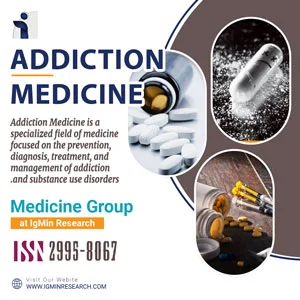About
Addiction Medicine is a multidisciplinary field that addresses the complex nature of addiction, integrating approaches from psychiatry, neuroscience, and pharmacology. This dynamic discipline explores the mechanisms underlying substance use disorders and behavioral addictions, with a focus on prevention, diagnosis, treatment, and recovery. Researchers in Addiction Medicine aim to understand the biological, psychological, and social factors that contribute to addictive behaviors, developing innovative strategies to support individuals in overcoming addiction.
By leveraging insights from genetics, neurobiology, and behavioral sciences, the study of Addiction Medicine is pivotal in advancing therapies for substance dependence and addictive behaviors. The field also encompasses research on comorbid mental health conditions, harm reduction, and evidence-based interventions that enhance patient outcomes. As addiction continues to pose significant public health challenges worldwide, the advancements in this field are crucial for improving treatment options and promoting long-term recovery.

Why publish with us?
Global Visibility – Indexed in major databases
Fast Peer Review – Decision within 14–21 days
Open Access – Maximize readership and citation
Multidisciplinary Scope – Biology, Medicine and Engineering
Editorial Board Excellence – Global experts involved
University Library Indexing – Via OCLC
Permanent Archiving – CrossRef DOI
APC – Affordable APCs with discounts
Citation – High Citation Potential
Which articles are now trending?
Research Articles
- Microgravity Employment in Archaeology – Available Experience and Future Perspectives
- Maternal Knowledge and Practices in Caring for Children under Five with Pneumonia: A Cross-Sectional Study in Vietnam
- Assessing Bee (Hymenoptera, Apoidea, Anthophila) Diversity and Floral Preference in Two Habitats in the Iberian Peninsula
- A Review inside Innovation: AI and Additive Manufacturing for Advanced Bone Scaffold Design
- Synergistic Assessment of Supplementation of Ascorbic Acid and Massularia acuminata Extracts on Serum Electrolyte and Lipid Profile Indices of Dyslipidemia in Adult Wistar Rats Exposed to Aluminum Chloride Toxicity
- Detection of Adenoviruses and Astroviruses in Patients and Marine Animals in the Republic of Guinea
Advertisement







